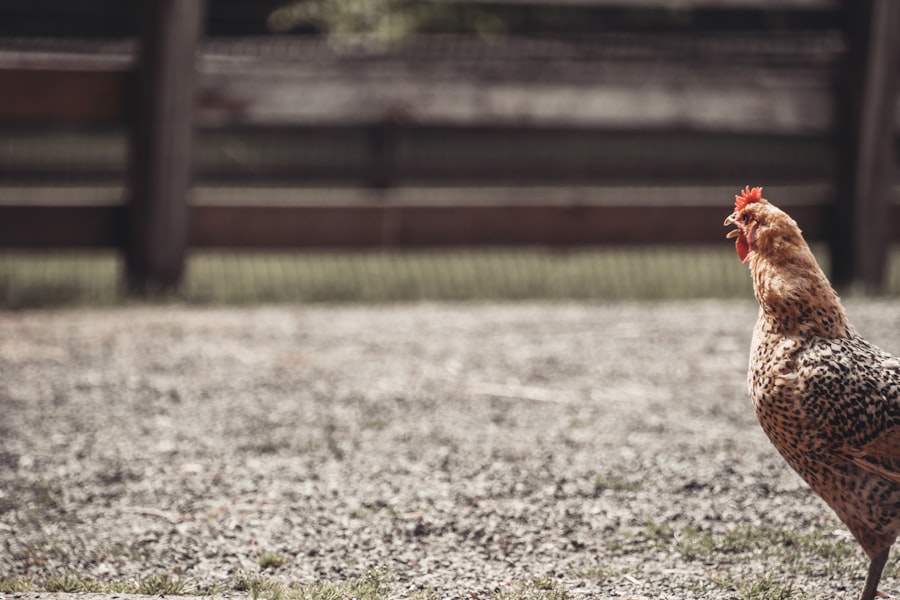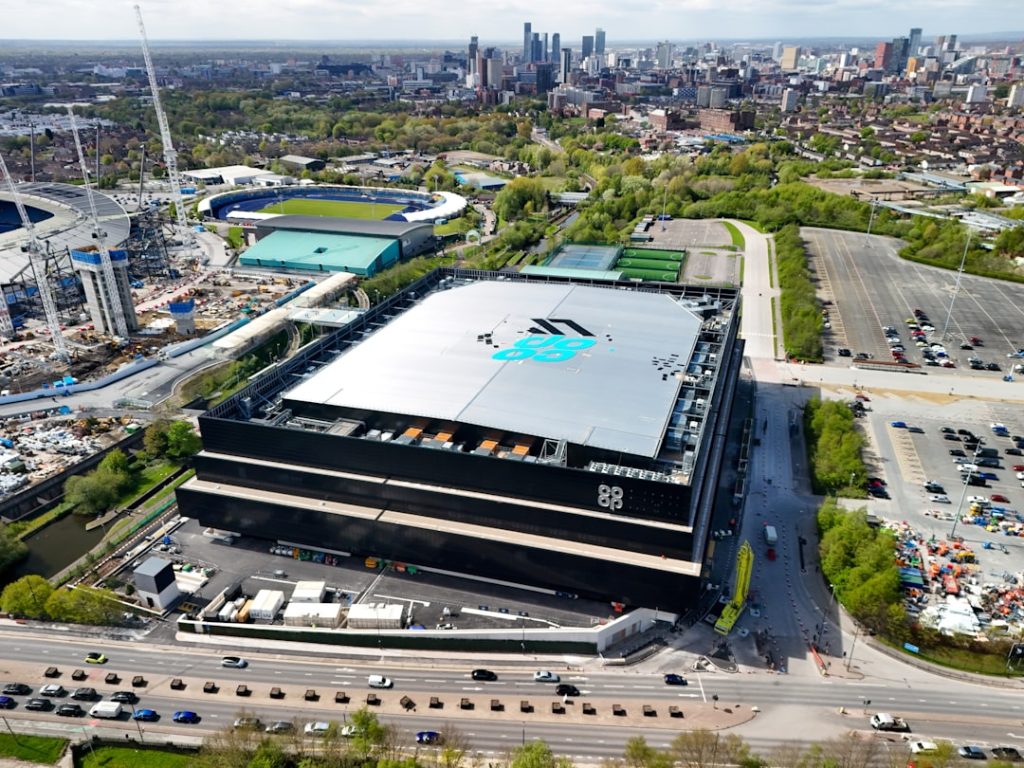Chickens are highly sensitive to heat and can suffer from heat stress, which can have a significant impact on their health and well-being. When temperatures rise, chickens can experience a range of negative effects, including decreased egg production, reduced feed intake, increased water consumption, and even death in severe cases. Heat stress can also lead to respiratory distress, dehydration, and decreased immune function, making chickens more susceptible to diseases.
Additionally, high temperatures can cause chickens to exhibit signs of distress such as panting, wing spreading, and lethargy. It is crucial for chicken owners to understand the impact of heat on their flock in order to take proactive measures to mitigate its effects and ensure the welfare of their birds. Furthermore, it is important to recognize that different chicken breeds may have varying levels of tolerance to heat.
For example, some breeds, such as the Leghorn, are more heat-tolerant than others and may be better equipped to handle hot weather. On the other hand, heavier breeds like the Orpington may struggle more in high temperatures due to their larger size and heavier feathering. Understanding the specific needs and vulnerabilities of different chicken breeds is essential for providing appropriate care during hot weather.
By recognizing the impact of heat on chickens and considering breed-specific factors, chicken owners can take proactive steps to protect their flock from the negative effects of high temperatures.
Table of Contents
- 1 Providing adequate shade for chickens
- 2 Ensuring proper ventilation in the coop
- 3 Offering cool treats and water for chickens
- 4 Adjusting feeding and watering schedules
- 5 Monitoring chicken behavior and health
- 6 Implementing additional cooling measures
- 7 FAQs
- 7.1 What are the signs of heat stress in chickens?
- 7.2 How can I keep my chickens cool during a heatwave?
- 7.3 What are some ways to provide shade for chickens?
- 7.4 How can I improve ventilation in the chicken coop during a heatwave?
- 7.5 Why is it important to offer cool water to chickens during a heatwave?
- 7.6 What are some frozen treats I can give to my chickens to help them stay cool?
Key Takeaways
- Heat stress can have a significant impact on chickens, leading to decreased egg production, poor growth, and even death.
- Providing adequate shade is crucial for chickens to escape the heat, whether it’s natural shade from trees or artificial shade structures.
- Proper ventilation in the coop is essential to allow hot air to escape and cool air to circulate, preventing heat buildup.
- Offering cool treats like frozen fruits and vegetables, as well as providing access to cool, fresh water, can help chickens regulate their body temperature.
- Adjusting feeding and watering schedules to cooler times of the day, such as early morning or late evening, can help reduce heat stress on chickens.
- Monitoring chicken behavior and health for signs of heat stress, such as panting, lethargy, or reduced egg production, is important for early intervention.
- Implementing additional cooling measures, such as misting systems or fans, can further help chickens cope with high temperatures.
Providing adequate shade for chickens
Creating Shaded Areas
One of the most effective ways to protect chickens from the heat is by providing them with adequate shade. This can be achieved by creating shaded areas within the chicken coop or run using tarps, umbrellas, or natural vegetation such as trees or shrubs. Additionally, it is important to ensure that the coop is positioned in a location that receives adequate shade throughout the day, especially during the hottest hours.
Benefits of Shade for Chickens
By providing ample shade, chicken owners can help their flock stay cool and comfortable, reducing the risk of heat stress and its associated negative effects. In addition to providing shade within the coop or run, it is also important to consider the availability of shade in the outdoor ranging area.
Shade in the Outdoor Ranging Area
If chickens are allowed to free-range, it is essential to ensure that there are shaded areas available for them to seek refuge from the sun. This can be achieved by strategically placing shelters or planting trees and bushes in the ranging area. By providing ample shade both within the coop and in the outdoor ranging area, chicken owners can help their flock stay cool and comfortable even during the hottest days of summer.
Ensuring proper ventilation in the coop

Proper ventilation is essential for maintaining a comfortable and healthy environment for chickens, especially during hot weather. Good ventilation helps remove excess heat, moisture, and ammonia from the coop, creating a more comfortable and sanitary living space for the birds. Inadequate ventilation can lead to a buildup of heat and humidity, increasing the risk of heat stress and respiratory issues in chickens.
Therefore, it is crucial for chicken owners to ensure that their coop is well-ventilated, particularly during hot weather. There are several ways to improve ventilation in the coop, including installing windows, vents, and fans to promote air circulation. Additionally, ensuring that the coop is not overcrowded and that bedding materials are kept clean and dry can help prevent the buildup of moisture and ammonia.
By maintaining proper ventilation in the coop, chicken owners can help their flock stay cool and comfortable, reducing the risk of heat stress and its associated negative effects.
Offering cool treats and water for chickens
During hot weather, it is important to provide chickens with cool treats and fresh water to help them stay hydrated and cool. Cool treats such as frozen fruits and vegetables or chilled watermelon can provide chickens with a refreshing source of hydration while also offering a source of entertainment and enrichment. Additionally, offering frozen treats can help lower the birds’ body temperature and provide relief from the heat.
Providing access to cool treats can help encourage chickens to eat and drink enough to stay properly hydrated during hot weather. In addition to cool treats, it is essential to ensure that chickens have access to an adequate supply of fresh, clean water at all times. Water is crucial for regulating body temperature and preventing dehydration in chickens, especially during hot weather.
Chicken owners should regularly check waterers to ensure they are functioning properly and refill them with fresh water as needed. Additionally, placing waterers in shaded areas can help keep the water cool and prevent it from becoming too warm in the sun. By offering cool treats and ensuring access to fresh water, chicken owners can help their flock stay hydrated and comfortable during hot weather.
Adjusting feeding and watering schedules
During hot weather, it may be necessary to adjust feeding and watering schedules to accommodate the changing needs of chickens. High temperatures can reduce chickens’ appetite and lead to decreased feed intake, which can impact their overall health and productivity. Therefore, it may be beneficial to offer smaller, more frequent meals throughout the day to encourage chickens to eat enough despite the heat.
Additionally, providing access to fresh grass or forage can help stimulate their appetite and provide additional nutrients. In terms of watering schedules, it is important to check waterers frequently and refill them with fresh water as needed throughout the day. In extreme heat, chickens may drink more water than usual to stay hydrated, so it is crucial to ensure that they have access to an ample supply at all times.
Adjusting feeding and watering schedules to accommodate the changing needs of chickens during hot weather can help ensure that they receive adequate nutrition and hydration despite the challenges posed by high temperatures.
Monitoring chicken behavior and health

Identifying Signs of Heat Stress
During hot weather, it is crucial to observe chickens for signs of distress, such as panting, wing spreading, lethargy, or reduced activity. Monitoring feed intake and egg production can also provide valuable insights into how chickens are coping with the heat.
Addressing Changes in Behavior and Productivity
Any changes in behavior or productivity should be noted and addressed promptly to prevent further complications. This includes monitoring the overall health of the flock during hot weather, checking for signs of dehydration, respiratory distress, or other heat-related issues that may require intervention.
Preventing Complications with Regular Health Checks
Regular health checks can help identify any potential problems early on and allow for timely treatment or adjustments to management practices. By closely monitoring chicken behavior and health during hot weather, chicken owners can take proactive measures to ensure the welfare of their flock and minimize the impact of heat stress.
Implementing additional cooling measures
In addition to providing shade, proper ventilation, cool treats, and adjusting feeding and watering schedules, there are several additional cooling measures that can be implemented to help chickens cope with hot weather. One option is to use misters or sprinklers in the outdoor ranging area to create a cooling effect for the birds. This can help lower ambient temperatures and provide relief from the heat during the hottest parts of the day.
Additionally, placing shallow pans of water or dust baths in shaded areas can provide chickens with a way to cool off by wetting their feathers or dusting themselves. Another cooling measure that can be implemented is using evaporative cooling pads or fans in the coop to lower temperatures and improve air circulation. These systems work by drawing warm air through wet pads or using fans to circulate air within the coop, creating a cooling effect for the birds.
Implementing additional cooling measures such as misters, dust baths, evaporative cooling pads, or fans can help create a more comfortable environment for chickens during hot weather and reduce the risk of heat stress. In conclusion, understanding the impact of heat on chickens is crucial for providing appropriate care during hot weather. By recognizing the specific vulnerabilities of different chicken breeds and understanding how high temperatures can affect their health and well-being, chicken owners can take proactive measures to protect their flock from heat stress.
Providing adequate shade, ensuring proper ventilation in the coop, offering cool treats and water, adjusting feeding and watering schedules, monitoring behavior and health, and implementing additional cooling measures are all essential strategies for helping chickens cope with hot weather. By taking these proactive measures, chicken owners can help ensure the welfare of their flock and minimize the negative effects of heat stress on their birds.
If you’re looking for more tips on keeping your chickens comfortable during a heatwave, check out this article on creating a Hannah Montana chicken coop. This article offers creative ideas for providing shade and ventilation for your flock during hot weather.
FAQs
What are the signs of heat stress in chickens?
Some signs of heat stress in chickens include panting, holding their wings away from their bodies, reduced egg production, and lethargy.
How can I keep my chickens cool during a heatwave?
You can keep your chickens cool during a heatwave by providing plenty of shade, ensuring good ventilation in the coop, offering cool water to drink, and providing frozen treats such as fruits and vegetables.
What are some ways to provide shade for chickens?
You can provide shade for chickens by using tarps or shade cloths to cover their coop and run, planting trees or shrubs for natural shade, and creating temporary shelters with umbrellas or portable shade structures.
How can I improve ventilation in the chicken coop during a heatwave?
You can improve ventilation in the chicken coop by installing windows or vents to allow for airflow, using fans to circulate air, and keeping the coop clean to prevent ammonia buildup, which can worsen heat stress.
Why is it important to offer cool water to chickens during a heatwave?
Offering cool water to chickens during a heatwave is important because it helps them stay hydrated and regulate their body temperature. Make sure to regularly change the water to keep it cool.
What are some frozen treats I can give to my chickens to help them stay cool?
You can give your chickens frozen treats such as watermelon, cucumbers, berries, or even frozen peas to help them stay cool during a heatwave. These treats also provide hydration and essential nutrients.
Meet Walter, the feathered-friend fanatic of Florida! Nestled in the sunshine state, Walter struts through life with his feathered companions, clucking his way to happiness. With a coop that’s fancier than a five-star hotel, he’s the Don Juan of the chicken world. When he’s not teaching his hens to do the cha-cha, you’ll find him in a heated debate with his prized rooster, Sir Clucks-a-Lot. Walter’s poultry passion is no yolk; he’s the sunny-side-up guy you never knew you needed in your flock of friends!







